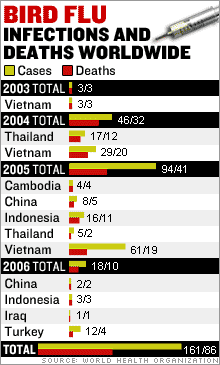|
Sanofi expands bird flu contract
French drug maker produces bulk concentrate of bird flu vaccines in U.S.; ships to NIH.
NEW YORK (CNNMoney.com) - Sanofi Pasteur expanded its bird flu contact with the U.S. government and shipped out thousands of experimental vaccine doses to build up stockpiles against the specter of a pandemic, the company said on Monday. Sanofi Pasteur, the vaccine-producing subsidiary of French drug giant Sanofi-Aventis (down $0.37 to $44.95, Research), said it sent 15,000 investigational doses to protect against H5N1, the influenza strain know as bird flu, to the National Institutes of Health.
Sanofi-Aventis valued the shipment at $50 million, and said it is in addition to the $100 million contract the company signed with the U.S. Department of Health and Human Services in September 2005. Part of this contract is for the company to find a way to speed up methods of vaccine production, which have been criticized as outmoded and slow. The shipment of vaccines, produced at a Swiftwater, Penn. plant, is considered a "bulk concentrate" that "will support U.S. Department of Defense requirements," said the company. The NIH will conduct studies to determine the most effective dosage for large numbers of people. The vaccines would be used to try and prevent infection of H5N1. Vaccines work differently from anti-virals like Tamiflu, which is taken by bird flu patients after they're infected to try and fight the virus. Sanofi-Aventis and the European drug maker Roche are considered leaders in the war against bird flu. Roche produces Tamiflu, but the company has admitted it can't produce enough to keep up with intense demand. H5N1 surfaces in birds and can spread to humans. The World Health Organization has confirmed 161 bird flu infections in people, resulting in 86 deaths. The deaths have occurred in five Asian nations, Turkey and, most recently, in Iraq. Infections stem from close contact with birds: Vietnamese men were infected after drinking raw duck blood pudding, and Turkish children became infected after playing catch with body parts from slaughtered birds. Bird flu is not transmitted from human to human. However, scientists recently determined that the 1918 influenza pandemic that killed at least 50 million people originated in birds, arousing fears that H5N1 might mutate into a virus that could be passed among humans.
To read about alternatives to Tamiflu, click here. |
|

